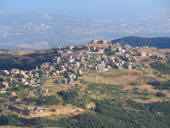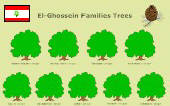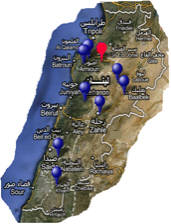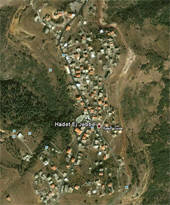



Known and Used Family Surnames
Spelling
Ghossein
Ghossain
Ghoussein
Ghoussain
Ghossayn
Ghoussayn
El-Ghossein
El-Ghoussein
El Ghossein
El Ghoussein
El Ghoussain
Elghossein
Elghoussein
Elghossain
El Ghossain
Al-Ghossein
Al Ghossein
Al Ghoussein
Al-Ghossain
Al-Ghoussain
Al Ghossain
Al Ghoussain
Alghossain
Alghossein
Elghosin
Gossine
Gosine
Gossain
Gossayn
(Random List)
Stories from Hadath Al Jebbeh
Al-Ghossain in South Africa - 1
One of the first Hadath al-Joubbeh al-Ghossains to immigrate to South Africa was Betrous (Peter) Moses al-Ghossain who was registered in South Africa by a civil servant, who decided to write the name of the family, “Gossayn”, which is still used up till now, by the family in Viljeonskroon in the Free state, “descendants of Peter’s brother Ghossain (Gossayn) Moses al-Ghossain”, and by the descendants of Peter’s first Cousin Younis Massoud al-Ghossain in Krugersdorp, and his family.
Ghossain (Gossayn) followed his eldest brother Peter after their Father Mousy (Moses) died, for their father forbade any of them to immigrate after Peter as long as he was alive. Ghossain left Lebanon – as he recorded in Arabic on the cover of one of his many history books – on the 5th day of December 1909 to land in what is called today Maputo on the 6th of January 1910, and left by train to Kimberly to look for his brother Peter, whom he found by accident after two years when a Boer who knew Peter by Mnr. Pieterse mistook Ghossain who looked like his brother Peter, and greeted him thinking he was Mnr. Pieterse. Although Ghossain’s (Gossayn) understanding of Afrikaans’s was rather poor, he somehow knew that the man knew his brother, whom eventually he found.
Their third brother Paul, who was younger than Peter, but older than Gossayn, met Deebi the widow of Hanna (John) Lewis al-Chidrawi who returned, with her children, to Lebanon from South Africa. She was a beautiful lady, and Paul was a real Shaikh Shabaab in the Hadath, a very handsome man with a beautiful singing voice, and, well, there was the marriage, which was held in secret for 7 days.
A secret in a mountain village does not hold for long, Paul’s mother Franjieh, who was also a Ghossain from the Imad al-Ghossain branch, found out what happened to the apple of her eye Paul, and a kind of a funeral was enacted in the al-Ghossain home.
Paul with his wife and her son Joe left to South Africa leaving her three daughters Youmna, who was married later to Paul’s younger brother Joseph, Azizi was married in Lebanon, and Audette, who became latter a nun by the name of sister Sinclairr.
The three brothers settled eventually in Walmarenstad. Peter was never married. Ghossain (Gossayn) married Najeebi the daughter of Danielle and Hawa (Eva) Shaheen – the name Shaheen, as Ghossain, was written by another civil servant, possibly the same genius who did the Gossayn damage, Shahim. Shahim is still used by the Shaheen (Shahim) family in Viljeonskroon Free State.
When Viljeonskroon was declared a town in the Free State, Daniele, and Hawa Shaheen (Shahim) , and their family moved to Viljeonskroon to be followed by their son-in-law Gossayn who started a butchery business in the young town.
Three daughters, Ethel, who was later married to Emil Saad from Ermelo, Hannoun, who was married to Alex Kayat (Khayat) from Durban, and Frances, who married her first cousin Daniel the son of Joseph, and Youmna who were mentioned earlier in this article; and three sons Daniel who married Yvette Kallil (Khalil) from Bloemfontein, Elias (Alec), who married Clemance Nasser from Johannesburg, and Moses who married Salimeh Joseph (Sfeir) from Potchefstroom.
Paul and Deebi had a son Moses who died very young, and Julie who was never married.Paul built a house on his farm in Walmarenstaad using cut stones like they do in Lebanon. Due to the urgent requests of his wife, and daughter, who wished to live in town, he sold the farm, to Mr. Oesthuizen, who dug in the vicinity of his newly acquired farm house to find a huge amount of diamonds.
Gossayn bought his first farm which was really 150 hectares of sand to keep his straying cattle, which he bought for the butchery, from being impounded by the municipality. His eldest son Daniel took a liking to farming, and was sent to a farming school which he left as soon as possible to start his farming career and to convince his father that using a tractor to plough, was superior to cattle ploughing. He laid the foundation to a very successful farming family.
(to be continued on next page)



